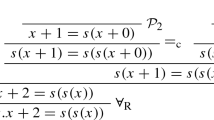Abstract
This article is the twenty-second of a series of articles discussing various open research problems in automated reasoning. The problem proposed for research asks one to find criteria for deciding when to permit and when to avoid demodulation during the application of inference rules, focusing mainly on hyperresolution, UR-resolution, and hyperparamodulation. Since these three inference rules admit natural points at which one or more demodulators (rewrite rules) could be applied-for example, after the removal of a literal or the replacement of a term-and since the dominant practice is to demodulate only after an inference rule has been completely applied, the proposed research focuses on an intriguing alternative. For evaluating a proposed solution to this research problem, we suggest problems from mathematics, logic, circuit design, program verification, and the world of puzzles.
Similar content being viewed by others
References
McCharen, J., Overbeek, R., and Wos, L., ‘Complexity and related enhancements for automated theorem-proving programs’, Computers and Mathematics with Applications 2, 1–16 (1976).
Robinson, G., and Wos, L., ‘Paramodulation and theorem-proving in first-order theories with equality’, in Machine Intelligence 4, ed. B. Meltzer and D. Michie, Edinburgh University Press, Edinburgh (1969), pp. 135–150.
Robinson, J., ‘Automatic deduction with hyper-resolution’, International Journal of Computer Mathematics 1, 227–234 (1965).
Wos, L., Robinson, G., Carson, D., and Shalla, L., ‘The conceptof demodulation in theorem proving’, J. ACM 14, 698–709 (1967).
Wos, L., and Robinson, G., ‘Maximal models oand refutation completeness: Semidecision procedures in automatic theorem proving’, in Word Problems: Decision Problems and the Burnside Problem in Group Theory ed. W. Boone, F. Cannonito, and R. Lyndon, North-Holland, New York (1973), pp. 609–639.
Wos, L., and McCune, W., ‘Negative hyperparamodulation’, in Proceedings of the Eighth International Conference on Automated Deduction, Springer-Verlag Lecture Notes in Computer Science, Vol. 230 ed. J. Siekmann, New York, Springer-Verlag (1986), pp. 229–239.
Wos, L., Overbeek, R., and Henschen, L., ‘Hyperparamodulation: A refinement of paramodulation’, pp. 208–219 in Proceedings of the Fifth International Conference on Automated Deduction, Springer-Verlag Lecture Notes in Computer Science, Vol. 87, ed. R. Kowalski and W. Bibel, Springer-Verlag, New York (1980).
Wos, L., Automated Reasoning: 33 Basic Research Problems, Prentice-Hall, Englewood Cliffs, New Jersey (1988).
Wos, L., Overbeek, R., Lusk, E., Boyle, J., Automated Reasoning: Introduction and Applications, 2nd edn., McGraw-Hill, New York (1992).
Author information
Authors and Affiliations
Additional information
This work was supported by the Applied Mathematical Sciences subprogram of the Office of Eneregy Research, U.S. Department of Energy, under Contract W-31-109-Eng-38.
Rights and permissions
About this article
Cite this article
Wos, L. The problem of demodulation during inference rule application. J Autom Reasoning 9, 141–143 (1992). https://doi.org/10.1007/BF00247829
Issue Date:
DOI: https://doi.org/10.1007/BF00247829




